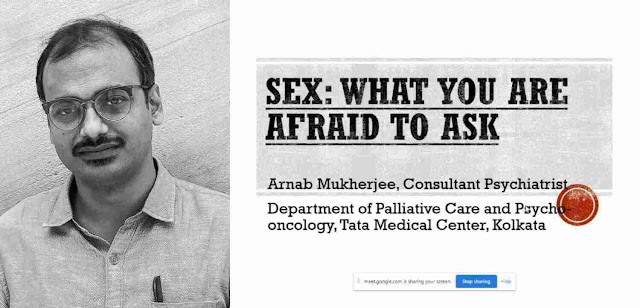 |
| Image courtesy of Dr. Arnab Mukherjee |
“Sex is a part of our life” and knowing about it is unequivocally necessary was pertinently stated by Dr. Arnab Mukherjee in a recently organised webinar on ‘Sex: What you are afraid to ask?’ by Adamas University. Dr. Mukherjee is the consultant psychiatrist, Department of Palliative care and psycho-oncology, Tata Medical Center, Kolkata.
He opined that in the Indian society, where talking about ‘sex’ is considered a taboo, there are very few studies related to sexual behavior and attitude. So, sex education is the need of the hour which can significantly influence on our physical and mental health.
Dr. Mukherjee says there are many misconceptions regarding sex and masturbation. Teenagers often have the misconception that loss of semen causes damage to health, developing sexual urges before 18 years of age is harmful, about the ideal length of the penis and frequency of sexual intercourse, which are nothing but a myth. A study showed that 70% of the people believe that developing sexual desires before the age of 18 is harmful, which is not so.
Commonly it has been found that most of the teenagers acquire knowledge about sex through sources which are misleading. 30-40% of the knowledge comes from watching videos while 32% is acquired from friends.
“Such sources can lead to high rates of sexual misconceptions and maladaptive sexual attitude”, Dr. Mukherjee says.
Dr. Arnab Mukherjee explains the difference between Infatuation, love and lust. A temporary attraction which generally fades over time is infatuation, while love is when a person really cares about the other person’s feelings. Love is supposed to deepen over time and is a committed process. On the other hand, lust is sexual desire and lasts only till the desire or urge of sex is fulfilled. He simplifies it by elaborating the meaning of a healthy relationship with partner.
If asked, ‘Can I go on a date?’ Dr. Mukherjee replies, “Yes, of course, but when you are ready for a long term relationship and you feel safe with the person”. He adds that we should remain aware of risks and should not meet in a private place. A public place like café, or a restaurant is suggested.
One should be careful while using social networking sites and dating apps. It has been found that dating apps are generally for casual sex over relationship or love. A question arose if matrimonial sites are safe.
Dr. Mukherjee iterated “Cybercrime is becoming very common, it is recommended that you initially do not share private photos or videos with the person you meet online or through matrimonial sites. Involving both the families when meeting is important.”
“Learn how to say ‘no’ when you’re not ready for it”, says Dr. Arnab Mukherjee while describing how one should refuse to have a sexual intercourse if he or she is not willing to. “It doesn’t matter if your married or unmarried, ‘no’ means ‘no’”, he adds. Avoid being alone with the person in a private place if you are not feeling safe. One must stick to his or her limits. Avoid using alcohol or drugs.
A lot of people especially the teenagers consult psychiatrist and says that they feel guilty about their sexual fantasies.
Dr. Arnab Mukherjee clarifies, “they are just thoughts and those does not indicate you are wrong or sick.”
Masturbation is a safe, normal, healthy and acceptable act. Yet, the teenagers have misconceptions like it leads to weakness, infertility, curvature of penis, causes acne, impotence, loss of calcium, decreases density of semen. But, that is not true. Dr. Mukherjee describes the benefits of masturbation. It controls the sexual response, relieves anxiety and tension, maintains better physical & mental health, and prevents STDs and unwanted pregnancy.
Talking about pornographic videos, Dr. Mukherjee highlighted the point that women are portrayed as an object. Porn shows unrealistic sex organs and behavior. The actors have undergone several plastic surgeries. This leads to unrealistic expectations about men, women, sexual behavior, sexual response and body appearance. Hence, arises the misconception.
There are ways to prevent getting addicted to porn. One can engage in physical activities and hobbies, take a break from internet and gadgets, restrict the access, consider masturbation without porn and avoid staying alone.
One might seek professional help when “it is interfering in your daily life activities”, says Mukherjee.
Questions arose why many women tend to fall for older men. Dr. Mukherjee says men mature later than women. On the other hand women tend to get attracted or fall for men who are older because of maturity, being able to handle and deal with things better than boys of the same age group.
It was asked that being a mother how one should provide the proper education to her child because amidst this pandemic, the digital media is widely accessed by every teenager. This makes them prone to sources which create misconceptions. Thus, it is necessary to provide proper sexual education to the growing teenagers. For instance, one must begin with physiology (Physiology is the study of how the human body works) and their changes in physical looks during teenage. This is a way how parents can protect their child from getting wrong information about sex.
To conclude, Dr. Arnab Mukherjee says “Sex is a part of life, yet it is not everything”.
Sexual knowledge is essential for physical and psychological health. Poor sexual knowledge makes one vulnerable to physical or sexual and unethical treatment practices and result in unsatisfactory interpersonal relationships.
Author:
Rupa Jana




Post a Comment